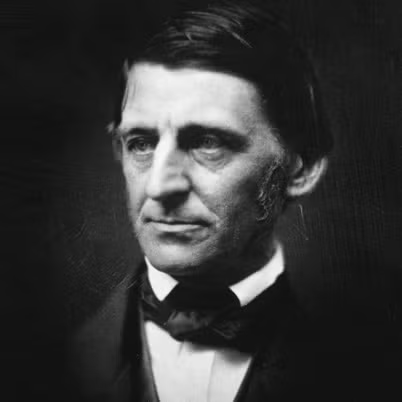
Table of Contents
Who Was Ralph Waldo Emerson?
Ralph Waldo Emerson (1803-1882) was an American essayist, poet, and philosopher, known for his role as a central figure in the Transcendentalist movement. He became widely influential through his writings and lectures, including notable works such as Self-Reliance and The American Scholar. Emerson’s exploration of individuality, self-reliance, and the connection between nature and spirituality had a profound impact on American literature and thought. Throughout his life, he continued to write and lecture, influencing generations of thinkers, writers, and social activists.
Early Life and Education
Emerson was born on May 25, 1803, in Boston, Massachusetts, to William and Ruth Haskins Emerson. His father, a clergyman, was part of a long line of ministers. Emerson attended the Boston Latin School and later graduated from Harvard University in 1821. He went on to study at the Harvard Divinity School and was licensed as a minister in 1826, eventually being ordained in the Unitarian church in 1829. Emerson married Ellen Tucker in 1829, but her death from tuberculosis in 1831 deeply affected him. This personal tragedy, along with a growing spiritual crisis, led him to resign from the clergy.
Travel and Writing
In 1832, Emerson traveled to Europe, where he met influential literary figures such as Thomas Carlyle, Samuel Taylor Coleridge, and William Wordsworth. Upon his return in 1833, he began delivering lectures on spirituality and ethical living. In 1834, he settled in Concord, Massachusetts, where he married Lydia Jackson in 1835. Emerson became part of a circle of thinkers in Concord, including Margaret Fuller, Henry David Thoreau, and Amos Bronson Alcott, father of the famous author Louisa May Alcott.
American Transcendentalism
The 1830s marked a pivotal period in Emerson’s intellectual development as he began delivering lectures that were later published as essays. His 1836 work Nature laid the foundation for his philosophy of Transcendentalism, which emphasized the importance of intuition, self-reliance, and the deep connection between humanity and nature. His 1837 lecture The American Scholar urged American writers to develop their own distinctive voice, free from the influence of European models.
Emerson became the leading figure of the Transcendentalist movement, which espoused the belief that individuals could transcend the physical world and connect with a higher spiritual reality through self-reflection and intuition. This group, which included figures like Thoreau, Fuller, and Alcott, believed that God and truth could be found within the individual, and that a deep connection with nature facilitated spiritual understanding.
The 1840s were a productive time for Emerson. He co-founded and edited the literary magazine The Dial, which became a platform for Transcendentalist ideas. He also published two influential volumes of essays in 1841 and 1844, including works such as Self-Reliance, Friendship, and Experience, which became essential texts in American philosophy and literature. During this time, Emerson also became a father to four children.
Later Work and Life
In his later years, Emerson’s work, such as The Conduct of Life (1860), adopted a more balanced approach, reconciling personal freedom with the responsibilities of social involvement. He advocated for abolition and spoke out against slavery, continuing to lecture on these issues throughout the 1860s. By the 1870s, Emerson had become a revered figure in American intellectual life, earning the title of “the sage of Concord.” Despite his declining health, he continued to write and publish, releasing Society and Solitude (1870) and a collection of poetry, Parnassus (1874).
Death
Ralph Waldo Emerson passed away on April 27, 1882, in Concord, Massachusetts. His work and ideals left an indelible mark on American thought, inspiring figures such as Henry David Thoreau, Walt Whitman, and many others. Today, Emerson’s writings remain foundational in the study of 19th-century American literature, philosophy, and spirituality.
